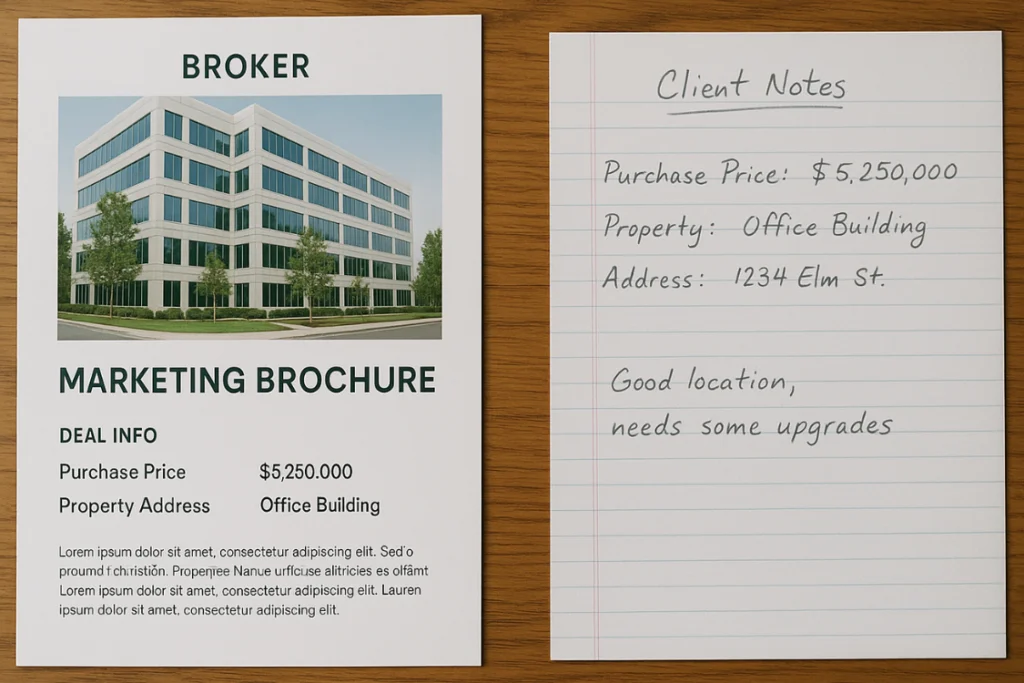Not all business brokers are as good as they claim. So, how do you separate the experts from the smooth talkers? One of the fastest ways to see past the sales pitch and evaluate a broker’s track record with past clients is to ask for business broker client references. Good brokers provide them willingly. Others dodge the request, offer outdated contacts, or share coached responses that hide poor service or failed business transactions. Relying only on a broker’s word puts your business goals, selling price, and deal outcome at risk.
This guide helps you use client references to better assess a broker’s ability and identify potential risks before moving forward.
Why Broker References Matter
Client references help you check a business broker’s real track record, not just their sales pitch. Most business owners won’t get a second chance at selling their business, so verifying past results and the broker’s ability to attract buyers is critical.
A good business broker should back up their promises with examples from past clients, not just industry talk. These references can confirm if the broker handled complex transactions, responded to market trends, and led a structured process that generated interest from prospective buyers and strategic buyers alike.
Real client experiences offer insight beyond the pitch
Online reviews only tell part of the story. When business owners rely solely on testimonials or star ratings, they may miss critical insights into how a broker actually performs during the sales process. Speaking directly with past clients provides richer, behavior-based feedback, including how the broker navigates negotiations, adapts to challenges, and qualifies buyers in real-world scenarios.
What’s often overlooked is that online reviews, especially generic or overly positive ones, fail to highlight deal complexity or seller experience. A recent study found that consumers, particularly women, pay more attention to negative comments and are more influenced by critical feedback than by praise. However, the same research also revealed that people struggle to detect fake reviews, which further weakens the trustworthiness of online testimonials.
This is why real client conversations offer insight beyond the pitch. A credible broker won’t just share glowing highlights; they’ll connect you with owners who can speak candidly about what went well, what didn’t, and how the broker handled both
References help verify deal claims and service quality
It’s easy for a broker to say they’ve sold many businesses or know how to attract serious buyers. A direct reference from someone whose financial statements and deals they personally handled is much stronger.
These conversations may reveal how the broker approached key stages of the deal, including valuation, outreach, and closing.
Good brokers provide them willingly, bad ones don’t
A well-connected broker should be able to provide recent, relevant client references without delay. If you ask and only get outdated names, vague responses, or excuses about privacy, that’s a red flag.
Many business owners use references to help make confident decisions when hiring a business broker. If a broker hesitates, they may be hiding issues with upfront fees, deal outcomes, or their ability to attract qualified interest. Asking the right key questions here can make a significant difference.

Ask: “Can You Share Two Client References?”
Asking for client references is a simple step that reveals a lot about a broker’s confidence and credibility. The way they respond gives you a preview of how they’ll handle future requests, questions, or concerns.
Look for a clear, direct answer. Pay attention to how they react and how quickly they follow up with details.
How brokers respond reveals their confidence
A good broker won’t hesitate. You should hear something like, “Absolutely, here are two past clients you can call today.”
If they fumble the question, try to change the subject, or say they’ll “check with someone,” they may not have satisfied clients to speak for them. That raises questions about the broker’s track record and overall ability.
What a fast, clear answer suggests
Experienced brokers who have handled multiple clients and successful business transactions usually keep references on hand. A fast response often signals a proven track record, solid communication skills, and a list of satisfied clients.
It also shows they’ve built trust and can provide real proof of their business broker client references, not just surface-level claims.
Why delays or excuses are red flags
If a broker says they need days to “get permission,” or only sends old contacts from unrelated deals, that’s a warning sign.
You’re looking for someone who can guide you through complex transactions, attract strategic buyers, and understand market dynamics. Weak or missing references suggest gaps in the broker’s background, or unhappy clients they don’t want you to meet.
What to Ask the References Directly
Talking to past clients lets you hear how the broker actually performed. Don’t just ask, “How was it?” Use specific business questions that bring out useful details.
Listen to how the broker approached the sale, handled problems, and supported the seller.
Did the broker deliver on their promises?
Ask what the broker said at the start and whether they followed through. Did they reach the right buyer? Did the business land near the promised selling price?
If there was a major gap between expectations and the outcome, find out why. Inconsistent follow-through may reveal gaps in the broker’s ability or marketing strategy.
How well did they communicate throughout the deal?
Selling businesses often includes delays, document reviews, and legal assistance. Strong communication helps business owners feel informed and supported.
Ask if the broker explained key steps, gave timely updates, and helped manage the negotiation process with potential buyers.
Would you work with them again, and why?
This is one of the most valuable insights you can get. If the seller would hire the broker again, ask what made the experience worth it.
Suppose they wouldn’t, ask why. The answer can reveal hidden problems with the broker’s approach, fee structure, or how they handled the final stages of the deal.

Signs of Honest, Helpful Feedback
Not all client references are equal. Some offer real insights. Others feel rehearsed or vague. The difference often lies in how specific and balanced the feedback is.
Pay close attention to how openly a past client discusses the deal and the broker’s role in it.
Specifics about the deal process, marketing, and challenges
When speaking with previous clients, listen for specific examples that show how the broker managed the sales process. These details reveal the broker’s experience, approach to direct outreach, and ability to attract potential buyers using effective strategies. Look for responses that mention:
- How the business broker structured the deal process, from preparing financial statements to closing
- Which marketing strategy did the broker use to generate interest and reach prospective buyers
- If the broker used direct outreach or relied on passive listings to attract buyers
- How they handled delays, buyer concerns, or market challenges during the transaction
- How many businesses the broker had sold, and whether those sales reflect relevant industry experience
- What the broker did to bring in the right buyer and avoid wasting time with unqualified leads
Answers like these suggest the broker played an active role in helping the deal progress.
Willingness to share both pros and cons
Even the best brokers face challenges during complex transactions. A reference that includes both wins and rough spots shows the feedback is honest.
If everything sounds perfect, the reference may be coached. Good business broker client references usually include a few lessons learned or minor frustrations alongside praise.
Consistency with what the broker told you
If the client’s story matches the broker’s version, such as the same timeline, same outcome, and same buyer type, it shows reliability.
But if there are gaps in the story or mismatched details, it’s a reason to question the broker’s background or credibility. Most business owners want a broker who tells the truth and owns the full picture, not just the highlights.

What References May Not Say (Unless You Ask)
Some references don’t mention issues unless you bring them up. That’s why your questions matter. It’s your job to ask what others might avoid.
Use follow-up questions to uncover areas often left out.
Hidden frustrations about speed, fees, or communication
A seller may not complain unless prompted. Ask if there were delays, unclear marketing fees, or long gaps between updates.
These small frustrations can make a big difference during a business sale, especially if the deal stretches over several months or hits legal or regulatory requirements.
Whether the broker pushed unrealistic expectations
Ask if the broker gave an accurate valuation or made the deal sound easier than it was. Some brokers inflate the likely selling price just to win the listing.
Past clients can tell you if the broker’s expertise helped set clear goals or if they felt misled about what the business was worth.
If the seller felt pressured or unsupported at any point
A successful business sale isn’t just about the final price. It’s also about how you’re treated along the way.
If a seller felt pressured into accepting an offer, left out of key decisions, or unsupported during high-stakes moments, that’s a red flag. A reputable broker doesn’t just chase deals. They guide owners through complex decisions with care and alignment.
Research on sales ethics highlights the dangers of aggressive selling and emphasizes the value of a moral reasoning framework in guiding professional behavior. The best brokers act ethically by helping sellers weigh choices, understand trade-offs, and avoid coercion. A transparent, supportive process isn’t just more professional; it’s more ethical in a market that increasingly demands integrity and trust.
That’s why brokers should guide, not push, sellers during negotiations, and ensure their decisions align with both business goals and ethical standards.
When to Be Cautious with Broker References
Not every reference builds trust. Some raise red flags that you shouldn’t ignore. Use your judgment and look for patterns.
Even a well-written bio or flashy success story can’t replace clear, honest references.
Only receiving outdated or irrelevant contacts
If a broker only offers contacts from deals that closed years ago or from unrelated industries, ask why.
A business broker who regularly handles sales should have recent references from specific business types, not just one-off wins. You want to hear from someone with a situation like yours, such as the same market, similar business size, or comparable deal terms.
Clients who seem coached or vague
If the reference only gives surface-level praise like “they were great” or “we’re happy,” ask for details.
Coached responses often avoid facts like how long the business sale took, how many interested buyers showed up, or how the broker handled the final stages. Honest reviews mention ups and downs, not just polished lines.
References that avoid giving clear yes/no answers
Some references may sound polite, but avoid giving clear yes or no answers. This can be a sign that the experience wasn’t smooth or that there were concerns the client doesn’t want to share openly. When a past client hesitates or speaks in circles, watch for these signs:
- They won’t confirm if the business broker met their expectations or delivered a successful transaction
- They dodge questions about the broker’s fee structure or any upfront fees charged during the deal
- They give vague responses about the sales process or the negotiation process
- They avoid saying whether the broker helped them find the right buyer or attract serious buyers
- They can’t explain how the broker’s approach or industry experience made a significant difference
Clear, honest answers build trust. A reference that avoids specifics may be politely warning you to keep looking.

Use Broker References to Confirm Skill, Not Just Promises
Client references reveal how a business broker really performs under pressure. They help verify the broker’s track record, show how they managed the sales process, and confirm whether they attracted serious buyers.
Ask direct questions and compare what the broker told you with what past clients say. Look for clear, specific details, not vague praise.
Many experienced brokers can provide recent references, share real examples, and explain how they’ve guided past clients through the sale process. Checking those references gives you a clearer view of the broker’s ability and helps you avoid surprises during the sale process.
Frequently Asked Questions
Should I ask for broker references before hiring them?
Yes, asking for business broker client references helps verify the broker’s track record, past clients, and ability to handle complex business transactions.
What questions should I ask a broker’s former clients?
Ask if the broker delivered a successful sale, communicated well during the sales process, and attracted qualified buyers that matched the business goals.
Can references be fake or misleading?
Some references can be curated or coached, so verify details like previous sales, negotiation process, and marketing strategy to confirm accuracy.
What if a broker hesitates to provide references?
Hesitation to provide references is a major red flag and suggests the broker may lack satisfied clients or a proven track record.
How many references should I ask for?
Request at least two or three client references to get a clearer picture of the broker’s expertise, industry connections, and ability to deliver a smooth transaction.
References
- Chen, T., Samaranayake, P., Cen, X., Qi, M., & Lan, Y.-C. (2022). The impact of online reviews on consumers’ purchasing decisions: Evidence from an eye-tracking study. Frontiers in Psychology, 13, Article 865702. https://doi.org/10.3389/fpsyg.2022.865702
- Kumar, P., Begum, V., & Masoud, E. Y. (2025). Sales pressure and ethical selling: Moral reasoning framework for business and marketing decisions. South Asian Journal of Business Ethics, Advance online publication. https://doi.org/10.1177/23197145251330150



